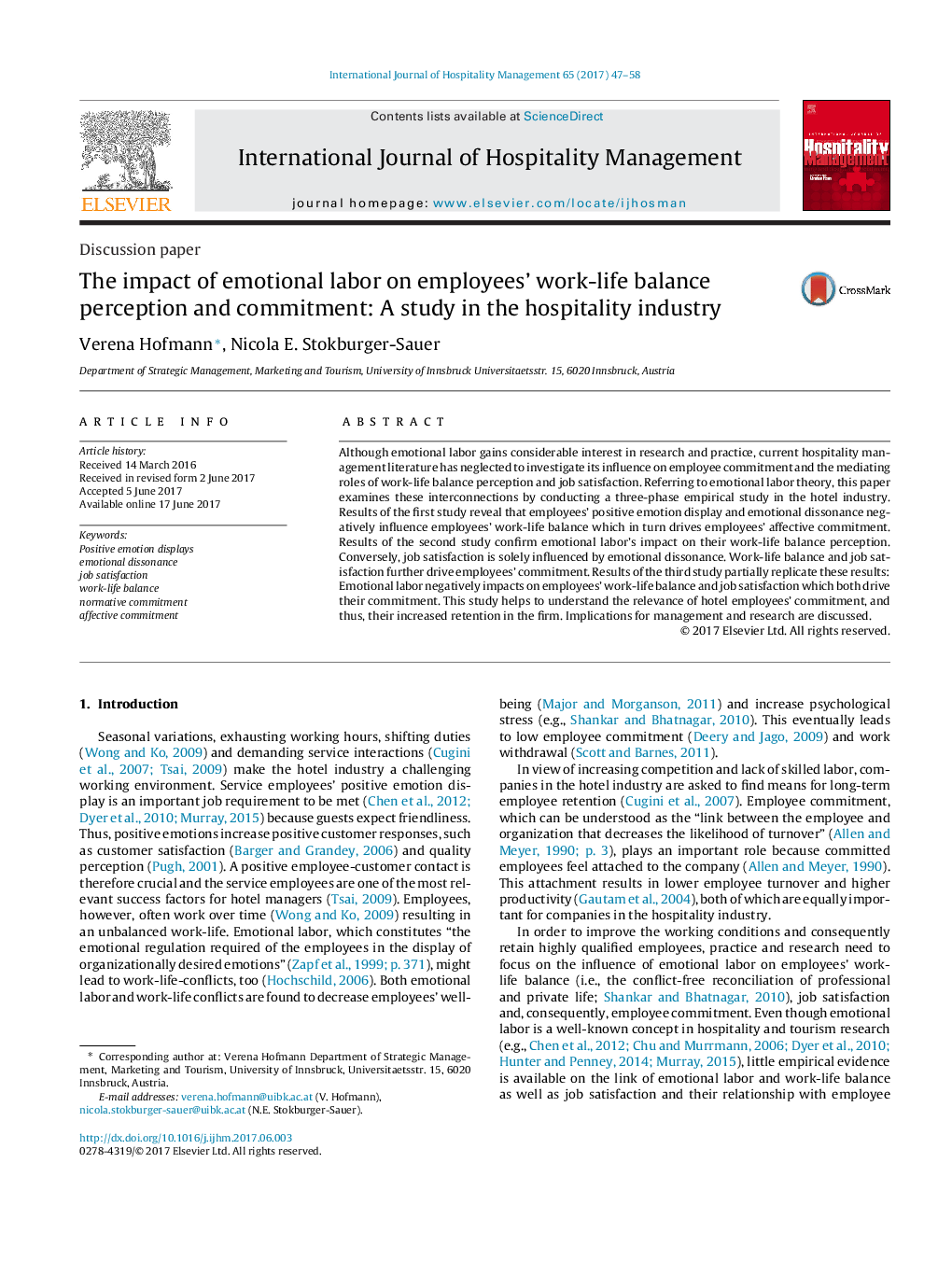| کد مقاله | کد نشریه | سال انتشار | مقاله انگلیسی | نسخه تمام متن |
|---|---|---|---|---|
| 5108223 | 1482472 | 2017 | 12 صفحه PDF | دانلود رایگان |
عنوان انگلیسی مقاله ISI
The impact of emotional labor on employees' work-life balance perception and commitment: A study in the hospitality industry
ترجمه فارسی عنوان
تأثیر کار عاطفی بر ادراک و تعهد تعادل کار و زندگی کارکنان: مطالعه در صنعت مهمان نوازی
دانلود مقاله + سفارش ترجمه
دانلود مقاله ISI انگلیسی
رایگان برای ایرانیان
کلمات کلیدی
نمایش احساسات مثبت، اختلال احساسی، رضایت شغلی، تعادل زندگی کاری، تعهد هنجاری تعهد موثر،
ترجمه چکیده
اگر چه کار عاطفی به منافع قابل توجهی در تحقیق و عمل دست می یابد، ادبیات مدیریت فعلی مهمان نوازی توجه خود را به بررسی تأثیر آن بر تعهد کارکنان و نقش واسطه ای ادراک تعادل کار و زندگی و رضایت شغلی نادیده می گیرد. با اشاره به نظریه کار عاطفی، این مقاله با بررسی یک مطالعه تجربی سه فاز در صنعت هتل، این اتصالات را مورد بررسی قرار می دهد. نتایج اول مطالعه نشان می دهد که نمایش احساسات مثبت کارکنان و اختلال احساسی منفی بر تعادل کار و زندگی کارکنان تاثیر می گذارد که به نوبه خود باعث تعهد عاطفی کارکنان می شود. نتایج مطالعه دوم تأثیر تأثیر کار هیجانی بر ادراک تعادل کار و زندگی آنها را تأیید می کند. برعکس، رضایت شغلی تنها تحت تأثیر اختلالات عاطفی قرار می گیرد. تعادل کار و زندگی و رضایت شغلی بیشتر باعث تعهد کارکنان می شود. نتایج مطالعات سوم تا حدی این نتایج را تکرار می کنند: کارهای هیجانی منفی بر تعادل کار و زندگی کارکنان و رضایت شغلی تأثیر می گذارد که هر دو تعهد خود را به عهده می گیرند. این مطالعه به درک ارتباط اهمیت کارکنان هتل و در نتیجه افزایش نگهداری آنها در شرکت کمک می کند. پیامدهای مدیریت و تحقیق مورد بحث قرار گرفته است.
موضوعات مرتبط
علوم انسانی و اجتماعی
مدیریت، کسب و کار و حسابداری
استراتژی و مدیریت استراتژیک
چکیده انگلیسی
Although emotional labor gains considerable interest in research and practice, current hospitality management literature has neglected to investigate its influence on employee commitment and the mediating roles of work-life balance perception and job satisfaction. Referring to emotional labor theory, this paper examines these interconnections by conducting a three-phase empirical study in the hotel industry. Results of the first study reveal that employees' positive emotion display and emotional dissonance negatively influence employees' work-life balance which in turn drives employees' affective commitment. Results of the second study confirm emotional labor's impact on their work-life balance perception. Conversely, job satisfaction is solely influenced by emotional dissonance. Work-life balance and job satisfaction further drive employees' commitment. Results of the third study partially replicate these results: Emotional labor negatively impacts on employees' work-life balance and job satisfaction which both drive their commitment. This study helps to understand the relevance of hotel employees' commitment, and thus, their increased retention in the firm. Implications for management and research are discussed.
ناشر
Database: Elsevier - ScienceDirect (ساینس دایرکت)
Journal: International Journal of Hospitality Management - Volume 65, August 2017, Pages 47-58
Journal: International Journal of Hospitality Management - Volume 65, August 2017, Pages 47-58
نویسندگان
Verena Hofmann, Nicola E. Stokburger-Sauer,
